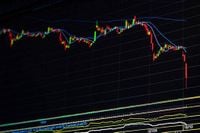The S&P 500 Index has dropped below 5,450 points for the first time in 2025, a significant decline that reflects the U.S. stock market’s reaction to the tariffs imposed by the White House. President Donald Trump announced a 10% tariff on most goods imported into the United States, with Asian countries bearing the brunt of this decision. This move has escalated the ongoing global trade war, prompting European Commission President Ursula von der Leyen to declare, "The consequences will be devastating for millions of people worldwide," adding that the 27-member EU bloc is preparing to retaliate if negotiations with Washington fail.
Following the tariff announcement, stock markets in Beijing and Tokyo fell to multi-month lows, signaling a ripple effect across global markets. Gold soared to a new all-time high, surpassing $3,160, while the U.S. dollar weakened against other major currencies. The S&P 500 Index is now trading at levels last seen in September 2024, before Trump’s election victory, highlighting the bearish sentiment that has taken hold of investors.
Despite a brief recovery in March, the S&P 500 fell a further 3.4% last week, and as of April 2, 2025, it is down 4% year to date, translating to a loss of 511 points from its all-time high set in mid-February. The Trump administration’s tariff policies continue to rock the markets, leading investors to shift capital into cash and safe-haven assets. Notably, major companies like Tesla and Moderna are down over 30% this year, reflecting the broader impact of these policies.
In this tumultuous climate, investment strategies are shifting. Warren Buffett’s investment firm, Berkshire Hathaway, has been stockpiling cash for several months, now boasting over $330 billion on its balance sheet. While Buffett has not publicly stated the reasons for this move, it appears to be a strategic decision to capitalize on low prices before a potential rebound. His famous adage, "Be fearful when others are greedy and greedy when others are fearful," resonates strongly in the current market environment.
After the COVID-19 pandemic, the S&P 500 experienced a remarkable recovery, climbing almost 90%. When the index dipped again in 2022, Buffett went on a $34 billion shopping spree, which paid off as the S&P gained over 55% in the following two years. However, with current market conditions prompting fear among investors, many analysts expect the S&P 500 to fall further this year before bouncing back, potentially offering value investors opportunities to consider low-cost shares.
Top U.S. tech firms have been among the hardest hit by tariffs, yet many still hold significant value, suggesting that the sector could see a notable rebound later this year once the costs associated with tariffs are absorbed. For UK investors, funds like Scottish Mortgage (LSE: SMT) provide broad exposure to this industry, holding a diverse portfolio that includes tech giants like Spotify, Meta, and Nvidia, along with a mix of e-commerce, healthcare, and decarbonisation stocks.
Scottish Mortgage boasts an ongoing charge of 0.34% and is currently trading at a 9.29% discount to net asset value (NAV), meaning investors can gain exposure to its assets for almost 10% less than buying them individually. However, this discount may indicate a lack of confidence in the fund’s management, which could limit potential gains compared to individual stocks once a rebound occurs.
In addition to U.S. markets, Panmure Liberum strategists predict a potential bear market for U.S. stocks, foreseeing a drop of more than 20% from the all-time highs recorded in February 2025. The strategists, Joachim Klement and Susana Cruz, suggest that the S&P 500 could fall to 4,915 points, a decline of 13% from the close on April 2, 2025. They expect a correction in the UK and EU stock markets but do not anticipate these markets entering a bear market, believing that UK stocks will likely emerge as relative winners due to facing only half the tariffs imposed on EU counterparts.
The current landscape presents a complex picture for investors, with the potential for significant market shifts influenced by ongoing trade policies and global economic conditions. As the dust settles from the recent tariff announcements, investors are left to navigate an uncertain terrain, weighing risks against opportunities.





